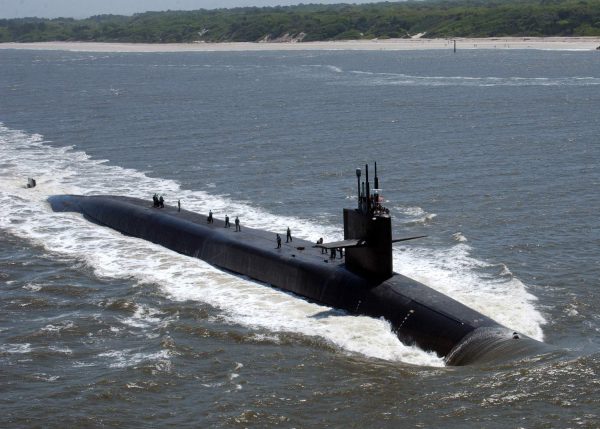During the period 2002-2008, the U.S. Navy, in response to the START II treaty, converted its four oldest Ohio Class ballistic missile submarines (SSBN) to guided missile submarines (SSGN). By installing vertical launching systems (VLS) in a “multiple all-up-round canister” (MAC), the SSGNs are capable of carrying up to 154 Tomahawk land attack missiles (TLAM). Two of the submarines’ 24 large vertical payload tubes were converted to lockout chambers for Special Forces personnel, such as Navy SEALS.
Similar to U.S. SSBNs, the four SSGNs operate with two separate crews, a Blue and a Gold crew. However, most of the SSGN crew swaps are done in theater, though the SSGNs are based in home ports of Kings Bay, Georgia and Bangor, Washington. Each SSGN operates on a 15-month cycle, consisting of a 3-month major maintenance period followed by one entire year deployed overseas. This results in the submarine being available in theater for nearly 70% of its time.
Like nuclear powered attack submarines (SSNs), SSGNs can operate undetected near an adversary’s homeland for extended periods. They can covertly insert Special Operations Forces and/or conduct strike operations with surprise, from close-in positions. Unlike surface combatants, SSGNs carry no defensive missiles – all payload tubes carry offensive weapons. That allows a single SSGN to cover strike packages for multiple surface combatants that can be assigned other duties when SSGN is operating in theater.

USS Florida (SSGN 728) returned to its homeport in Kings Bay, Georgia on 29 April 2011, following a 15-month deployment in both Central and European Command areas of responsibility. As tensions in Libya escalated, the order to use military forces in graduated and sequenced strike operations against the government of Libya was given by Secretary of Defense Robert Gates and Operation Odyssey Dawn was executed. During the operation, Florida launched more than 90 Tomahawk land attack missiles (TLAM). The strike marked the first time a guided-missile submarine launched Tomahawks in combat.
All four Ohio Class SSGNs will reach the end of their 42-year life and are scheduled to retire by 2028 without replacement. The Navy intends to add the Virginia Payload Module, containing four large vertical payload tubes, to future Virginia Class submarines beginning with Virginia Class Block V in 2019. Adding these Virginia Payload Module to planned future Virginia Class submarines is both a cost effective and innovative way to restore most of the undersea payload volume and payload capacity that will be lost when the SSGNs retire. To learn more about the Virginia Payload Module, please visit our page on the Virginia Class attack submarine.
